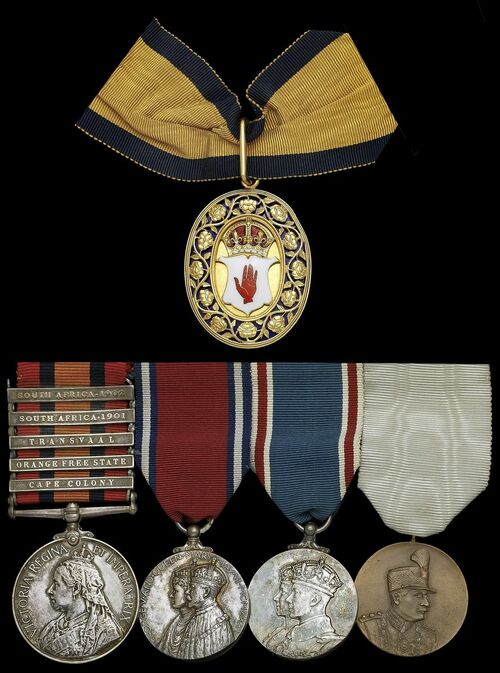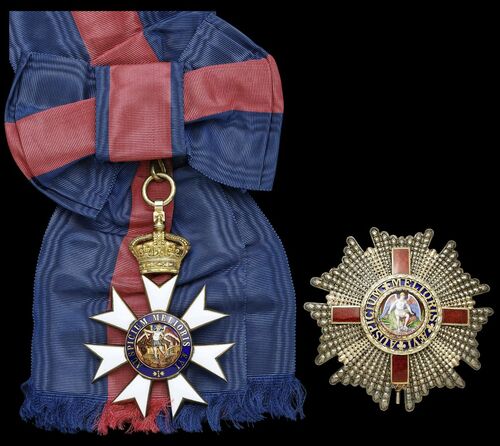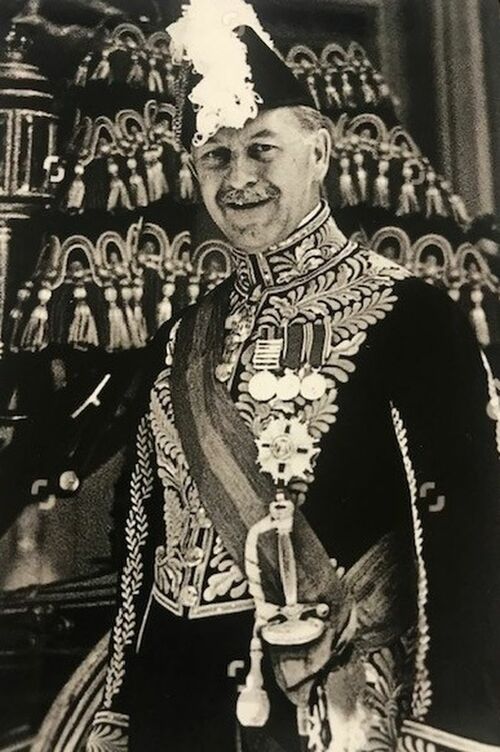Auction: 23003 - Orders, Decorations and Medals
Lot: 247
The outstanding G.C.M.G., Baronet's Badge group of six awarded to Sir P. L. Loraine, 12th (and final) Baronet of Kirk Harle, late Lieutenant, Imperial Yeomanry
Loraine cut his teeth during the Second Boer War, during which he was shot and wounded in an ambush on Eland's River in August 1901; he latterly joined the Diplomatic Service to become an Ambassador to Persia, Turkey - becoming a great friend of the Turkish President Mustafa Kemal Ataturk - and Italy, when he was charged with trying to keep Mussolini out of the Second World War until the eventual Fall of France
The Most Distinguished Order of St. Michael and St. George, Knight Grand Cross (G.C.M.G.), set of Insignia, comprising sash Badge and breast Star, silver-gilt, silver and enamel, with gold retaining pin, with its case of issue; Baronet's badge, gold and enamel, (Loraine of Kirkharle 1664), with its case of issue; Queen's South Africa 1899-1902, 5 clasps, Cape Colony, Orange Free State, Transvaal, South Africa 1901, South Africa 1902 (Lieut: P L. Loraine. Imp: Yeo:), dated clasps tailor's copies; Jubilee 1935; Coronation 1937; Persia, Reza Shah, Coronation Medal 1926, bronze, mounted, as worn slight enamel damage to the sash Badge, otherwise very fine (6)
G.C.M.G. London Gazette 11 May 1937.
Percy Lyham Loraine was born on 5 November 1880, the younger son of Rear Admiral Sir Lambton Loraine, 11th Baronet, who is best remembered for his involvement in the 'Virginius Affair' of 1873 and Frederica, daughter of Charles Acton Broke, co-heiress of the Brokes of Nacton. Educated at Eton and New College, Oxford, during which obtained a commission with the Imperial Yeomanry when the authorities were needing reinforcements for the Second Boer War.
Soldier - wounded
Posted for South Africa on 25 March 1901, he served with the 53rd (East Kent) Imperial Yeomanry and was promoted Lieutenant on 27 June 1901.
Riding in the rear-guard of a convoy on 30 August 1901, Loraine was wounded in a Boer ambush at the Eland's River bridge. The enemy attacked while he was crossing the bridge and he was caught in the opening volley, being shot through the right knee.
The wound healed in less than three months and he was able to resume his place in the unit. Loraine left South Africa on 21 April 1902 and arrived back in England on 9 May 1902, returning to Oxford to complete his studies.
Diplomat - Knighted
On completion of his studies, he joined the Diplomatic Corps in 1904, serving firstly in the Middle East at the British missions in Istanbul and Tehran, where he was Envoy. Then promoted to Second Secretary from 1909-16, during this time his brother died in a plane crash on 5 July 1912 on Salisbury Plain at the time he was unmarried and had no heirs. Loraine became First Secretary between 1916-20, and took part in the Paris Peace Conference at Versailles in 1919 before being sent as minister in Tehran and then Athens, and became Counsellor of the Embassy in 1920. As a result of the death of his brother, he succeeded the title of 12th Baronet when his father died in 1917. The title had been created on 26 September 1664 for Thomas Loraine, High Sheriff of Northumberland.
Loraine served at Envoy Extraordinary and Minister Plenipotentiary to Persia between 1921-26, for which he was awarded a C.M.G., followed by the same appointment in Greece. He was awarded his K.C.M.G. London Gazette 3 June 1925 as his Majesty's Envoy Extraordinary and Minister Plenipotentiary to His Majesty the Shah of Persia.
Appointed High Commissioner for Egypt and the Sudan in 1929, his policy of allowing King Faud I to contol the government led to his removal in 1933. He then becoming a Privy Councillor on 22 December 1933 and served as Ambassador Extraordinary and Plenipotentiary to Turkey between 1933-39, during this tenure he was awarded his G.C.M.G. as his Majesty's Ambassador Extraordinary and Plenipotentiary at Angora.
He became close to the Turkish President Mustafa Kemal Ataturk whilst serving in Ankara, which improved the relations between the two countries. While Ambassador, Loraine visited Ataturk on his deathbed and later gave a BBC broadcast paying tribute to Ataturk on the 10th anniversary of his death.
He had the same role in Italy between 1939-40 being the last British Ambassador to Italy before the start of the Second World War.
Loraine was handed the unenviable task of restraining Mussolini from joining Hitler's side, a task he managed with the help of Count Ciano until the fall of France.
On his return, Loraine became Chairman to the Home Office Advisory Committee (Italians) from 1940 and Chairman of the Anglo-Hellenic League from 1941. Sir Winston Churchill did not seek his advice on Middle Eastern matters during the war. He had the nickname of 'Pompous Percy' by his staff, so one assumes Churchill must have had the same opinion.
Retiring from his work in the Diplomatic Service in 1940, he took an interest in horse racing and thoroughbred breeding. His horse Darius was a star. Having had a successful two year-old year in 1953, the following year he won the 2000 Guineas and the St James's Palace Stakes, finished second in the Eclipse Stakes and third in both The Derby and the King George VI and Queen Elizabeth Stakes. Loraine worked for the Jockey Club on the introduction to photo-finish cameras to racing.
He had married Louise Violet Beatrice in 1924, she was the daughter of Major-General Edward Montagu-Stuart-Wortley, brother of the 2nd Earl of Wharncliffe. Loraine lived at Styford Hall, Stocksfield-on-Tyne, and at Wilton Crescent, Belgravia and his friends included Gertrude Bell, fellow diplomat Sir Lancelot Oliphant and Sir Arnold Wilson. He died on 23 May 1961 at his home in London, thus with no issue from the marriage, the Baronetcy became extinct; sold together with a copy of Professional Diplomat, Sir Percy Loraine, by Gordon Waterfield.
Subject to 20% VAT on Buyer’s Premium. For more information please view Terms and Conditions for Buyers.
Sold for
£3,500
Starting price
£2400









